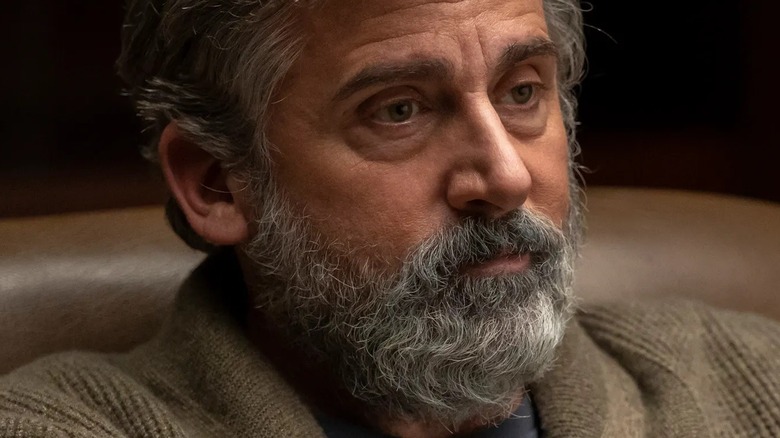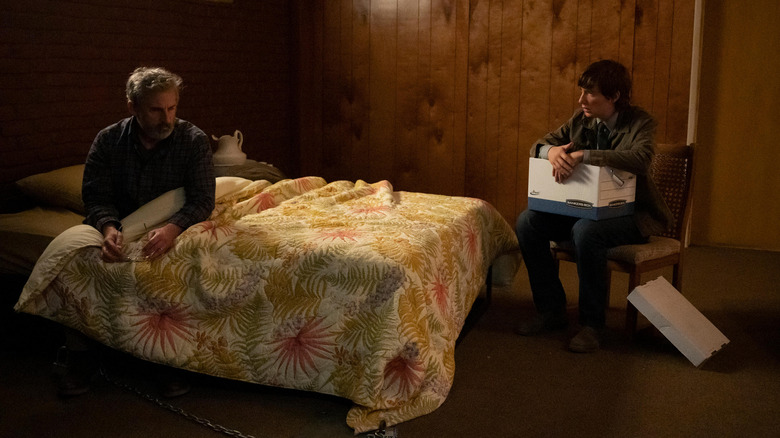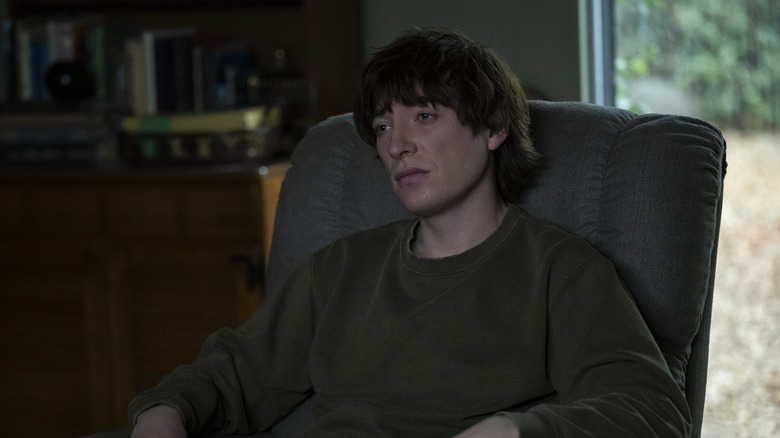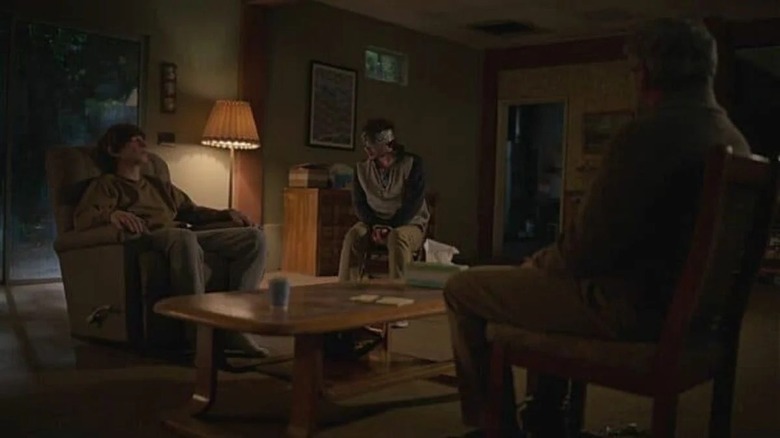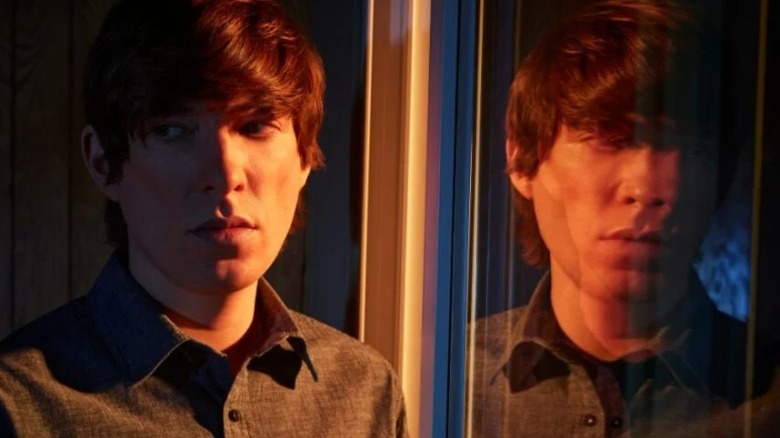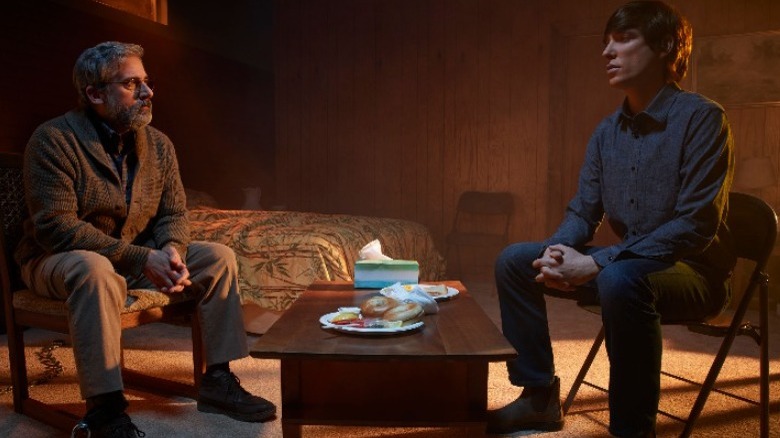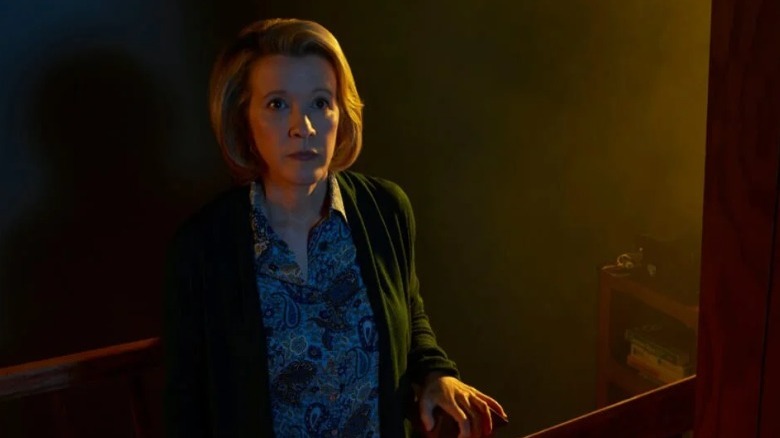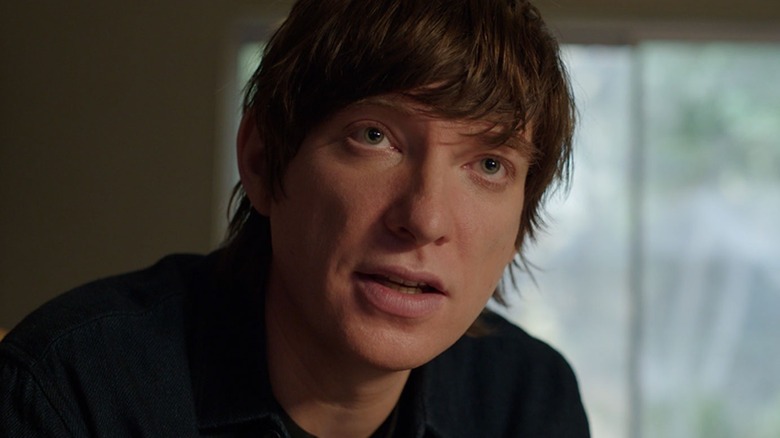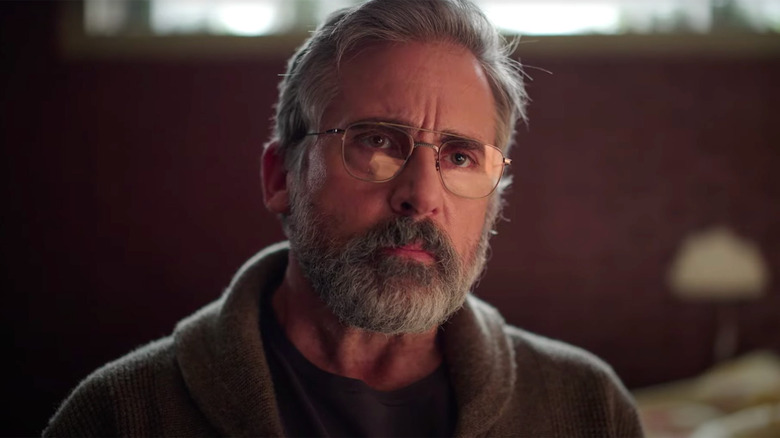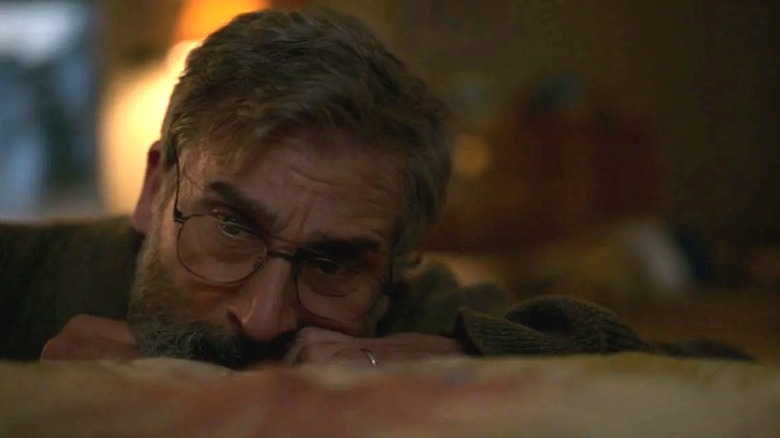The Patient's Most Disturbing Moments Ranked
A serial killer in need of rehabilitation isn't exactly an average Tuesday for a therapist. Dr. Alan Strauss (Steve Carell) is saddled with the wildest challenge of his career when his patient Sam Fortner (Domhnall Gleeson) kidnaps him and imprisons him in his own home. The goal? To help Sam turn away from his compulsion to stalk and murder poor souls who get under his skin. Sam knew that a conventional setting in a therapist's office wouldn't be viable for such a confession, so he opted to trap the doctor and force him to work his psychiatric magic.
The presence of "The Patient" gets totally upended as we learn more about the characters. It's in the past, rife with tragedy and familial conflict, where we truly begin to empathize with the good doctor. Even Sam's history might elicit some sympathy from viewers, given the abuse he endured at his father's hands. There is no doubt that Sam is a disturbed individual, a man crippled with violent compulsion and a lack of humanity. But there's something fascinating about a killer who's at least self-aware enough to seek out treatment.
"The Patient" is peppered with horrifying scenes that leave viewers gawking. We've ranked these moments from the least impactful to most disturbing. Spoilers ahead.
10. The kidnapping
Alan is a therapist who may be in need of his own consultation. Clearly depressed over his estrangement from his son, his day-to-day typically includes solitude and heavy contemplation. He's seeing a new patient, Sam Fortner, who seems desperate, but appears harmless. That is, until Alan finds himself waking up shackled to the floor in Sam's home.
You can imagine the confusion and terror Alan is experiencing in this moment. The very act of kidnapping is completely horrifying all on its own. But the idea that someone in your life has been waiting for this moment adds an entirely new level of fear to the situation. As viewers, we can practically see what Alan is thinking. With his eyes darting around the room and realizing there's no escape, he's likely running through all of his options while simultaneously wondering what could have possibly landed him in such a predicament.
One emotion he's likely feeling is betrayal, knowing that a patient he was regularly seeing has committed such a horrifying act. The fight or flight instincts of the human mind are likely abuzz and there's most certainly a lot to unpack for Alan as he tries to take stock of the situation. One thing's for sure — if he didn't need his own therapist beforehand, he definitely will now.
9. Sam's confession
What's more disturbing than being kidnapped and chained to the floor? Your abductor telling you that he's a serial killer, that's what. In Sam's eyes, kidnapping Alan and bringing him to his home is the only way he can get help without being arrested. He's not wrong — Alan would have been compelled to report his crimes to the authorities had he found out about them under normal circumstances. In a bid to be released, Alan tells Sam that he actually doesn't have to report any of his past misdeeds, that he only has to report him if he believes that he plans on doing harm to himself or to someone else going forward. Sam then quickly replies that he intends to kill someone, shutting Alan down and crushing his hopes for release.
The real kicker is when Sam reveals to Alan the extent of his crimes. He claims he has killed multiple people. Sam then asks Alan if he has heard of the John Doe killer. The serial killer earned this nickname for leaving the bodies of his victims behind without any form of identification. Sam then brings out a box full of personal effects belonging to other people. They're mostly wallets that contain forms of identification, but there are also watches and other identifying objects. Sam, it's now plain to see, is the John Doe killer. It's a terrifying reveal for Alan, who must be thinking that he's about to become his next victim.
8. Elias' capture and imprisonment
Alan gets taken on an emotional roller coaster ride when Sam reveals to him that he's currently stalking his next intended victim. In fact, he's been contemplating the murder of a restaurant owner's son for four months. This particular individual (played by Alex Rich) offended Sam, and he has lived in his head rent-free ever since. Sam explains to Alan that he wants to kill him desperately, but he hasn't gone through with it yet, hoping that he can get himself in check before he does the unthinkable.
Alan attempts to work on Sam's sociopathic tendencies by helping him link the act of murder to something very close to home — his mother. As a youngster, Sam was abused by his father and was protective of his mother. Alan suggests that every time Sam kills another person, he should think of the hurt and pain the act will inflict upon his own mother. While that seems to resonate with Sam, everything goes belly up one night when Sam arrives home with a victim bound and gagged.
Sam tells Alan that he stopped short of murdering this man because of his sessions with him — they had agreed to discuss violence before committing it. Later, Alan learns the man's name is Elias. He is, in fact, the restauranteur's son that Sam has been angling to kill for quite some time. Even though Sam doesn't kill Elias (immediately), the imprisonment is horrifying given that we can clearly see Sam has an itch he is just dying to scratch. As the audience, we're well aware that Sam can't just release Elias and expect him not to say anything, and this makes the whole thing all the more tense.
7. Sam's willingness to kill his ex-wife
In the penultimate episode, Alan suggests that the best way forward for Sam is for him to build lasting connections with other people. His relationships will give him purpose, something he feels Sam is lacking. Alan suggests that Sam invite his ex-wife Mary (Emily Davis) over for brunch. Sam clearly still has feelings for his ex-wife and she also has feelings for him, as shown by their meeting earlier in the series. The only reason they divorced is that Mary didn't feel like Sam actually loved her. Given what we know about Sam, love is likely a foreign emotion to him. Whether Sam loves Mary or not is hard to say, but he does state that he deeply cares for her.
Of course, Alan had an ulterior motive with this whole brunch scenario. He intended to assault Sam with Mary upstairs and then holler so she would hear the captive and call the police. However, the doctor has reservations about this plan, given that he knows it could lead to Mary's death. His assault on Sam could easily go south given that his only weapon is the sharpened edge of a tube of foot cream. As the brunch is about to begin, Sam tells Alan that he hopes he won't try anything stupid. Even though he cares for Mary, he wouldn't hesitate to kill her should he be backed into a corner. This admission further solidifies Sam's extremism and volatility to the audience, and it causes Alan to go back on his plan.
6. Sam murders his boss and recites the Kaddish
The next great offender to Sam's sensibilities is none other than his boss, Kyle Donohue (Tim Ransom). When Sam offers a suggestion to his superior, the man retorts that Sam should stay in his lane. It's a move that likely had all of us on edge, given what we know about Sam and how he displays his anger. Would he spend another four months stewing over his boss day in and day out? After all, he'd have to look at the guy every day at work. We can see that Sam is seething as he stalks Kyle on the streets of their town. He eventually has a run-in with the man and makes light of the "coincidental" meeting.
Later, long after the sun has disappeared, Sam's boss makes a fatal mistake — he takes an isolated back alley. Sam confronts his boss and unloads his frustrations verbally only for Kyle to scold him even more. Sam strangles Kyle and he dies on the cold hard ground in the dead of night. The killer then stands over the body and recites the Kaddish, a Jewish prayer taught to him earlier by Dr. Strauss. Whether the prayer is Sam mimicking remorse or an actual shred of humanity is unknown. We can only glean that the serial killer has been affected by the good doctor to some degree — even if he's still murdering others. This moment is rather jarring given that it shows Sam acting wholly on impulse. He disobeyed his agreement with Alan to discuss violence before acting on it, deciding his boss' fate in the space of a single day.
5. Sam's idea that he should murder his father
Sam's compulsions extend far beyond his desire to protect his mother and care for his ex-wife. He wants to save himself from his dark desires, but he begins to wonder if this is even possible. At one point, he tells Alan that "it's not working," and that therapy is just not cutting it. Sam killed Elias after four long months of wrestling with the idea. He's now killed his boss in an act of impulsive rage. There's simply no stopping Sam's unchecked reign of horror. Alan then inadvertently puts an idea in Sam's head that might spell even more trouble for the duo. He goes back to discussing the negative impact that Sam's father had on him, suggesting that he kills others not because of his father, but instead of his father. After all, Sam's rage is really directly linked to the mistreatment he suffered at his dad's hands.
Sam then points out that Edmund Kemper, a notorious American serial killer, detailed in a tell-all that his desire to murder went away after he killed his own mother. He realized that all of his murders were really just him acting out the killing of his own mother. Once he actually did the deed, he no longer felt compelled to kill. Sam begins to believe that he might have the same affliction and that ending his father's life could just be the thing that fixes him once and for all. Despite how awful his dad seems to be, patricide is not the angle Alan was going for.
4. The complicity of Sam's mother
There is no doubt that Sam is a disturbed individual. This comes from a lengthy stint of living in a dysfunctional home where his father regularly abused him and was quick to anger, but Sam's dad isn't the only one to blame: His mother Candace (Linda Emond) also had a hand in what he became. She is completely aware that he is a serial killer, yet she refuses to turn her son over to the authorities, despite how many lives he's taken. When it's revealed in the third episode that Candace lives in the same home in which Alan is being kept, the therapist pleads with her to do the right thing and set him free. She refuses, opting to protect her son.
Perhaps the most disturbing demonstration of Candace's complicity is when Elias gets murdered by Sam. She can hear the sounds of the murder taking place, yet she sits upstairs doing nothing, apparently frozen by horror. We get it — there's nothing quite like a mother's unconditional love. But having unconditional love for your child sometimes means doing something that they won't like, and that includes involving the authorities. Candace doesn't seem to understand that, and people keep dying as a result of that. The moment that the audience discovers that she knows all about her son's crimes is a truly shocking one.
3. Sam asking Alan how he wants to die
There's a moment following the murder of Sam's boss where Sam feels that therapy simply isn't working. After all, he just relapsed in a big way. Alan suggests that things always get worse before they get better. Still, Sam seeks out a new therapist. Mr. Buchella, one of Sam's former teachers, agrees to take him on as a patient. So, Sam delivers the news to Alan that he is, essentially, fired, and that Mr. Buchella will be taking his place in the coming weeks. Of course, this revelation only implies one thing: Alan's demise. There was never really any doubt that Alan wouldn't be able to walk away from this experience unharmed. Sam would never trust that Alan wouldn't go to the authorities. So, Sam has a hard conversation with Alan about the next steps.
He explains to Alan that he's never killed someone that he actually likes before, adding that he's entering new territory. He even asks Alan if there's a way in which he would prefer to die. Alan replies by telling him a story about a Frenchman, an Englishman, and a Jew who are sentenced to death. When asked how they would prefer to be killed, the Frenchman asks for a guillotine. The Englishman prefers the firing squad. When the Jew is posed the same question, he replies, "old age." Alan has unfinished business with his son Ezra, and he doesn't want to die. He wishes to make things right with his family and hopes to grow old doing so. Deep down, he now knows this won't happen. And for viewers, despite knowing that the prospect is inevitable, Sam asking the question marks a disturbing development in the story.
2. Alan's death
As viewers, we all hoped that Alan would survive and get the chance to rekindle his relationship with his estranged son. The nearer the season drew to its close, the more we came to realize that it would not be a happy ending. That is why this moment didn't actually secure the final placement in our ranking of most disturbing moments. Alan's death is almost poetic as it signifies the very thing he had attempted to tell Sam. He simply can't change without being physically stopped. Real change would require Sam to cultivate a new outlook, one that fills him with remorse over his past deeds to the extent he'd never want to commit such an act again. However, true remorse would only be evident if he were to turn himself in. In essence, Sam can't be treated without admitting his guilt where it counts.
Alan knew deep down that Sam couldn't do this. He wrote letters to his children in advance, which sets the stage for the decision Sam is about to make. Alan isn't a killer. He could threaten Candace's life in exchange for his release, but Alan knew he wouldn't actually go through with it. It was merely a last-ditch effort to push Sam into making the right decision concerning his life. After a brief glimpse at the happiness Alan could have enjoyed returning to his family, we see the true horror unfold as Sam grips Alan's neck, strangling the life out of him. Given the letters he had written to his children, we know that Alan made peace with his fate.
1. Elias' death
The horror of Alan's death pales in comparison to another: Elias' death is absolutely the most disturbing moment of the series. The show's writers put a lot of work into ramping up the tension and making us believe that Alan might actually be able to save the boy from his fate, dangling the carrot of hope. After all, Sam did defer to kidnapping Elias instead of outright killing him. In the quiet moments when Sam is away, Alan talks with Elias through the door and gets to know the young man on a deeply personal level. They exchange messages to their families should one of them survive. They even plot together regarding how they might get out of their predicament.
Eventually, Sam shows that he just can't resist. Alan attempts to stop him by suggesting they all have a therapy session together. He hopes that Sam can get to know Elias for the person he is, which may help stir feelings of sympathy within Sam. It's a tense, harrowing moment. Elias is shaking with fear. He senses that his demise is near and struggles to speak during the impromptu session. All the while, Sam gets increasingly agitated by Elias' presence. He eventually stands up and states that he's going to kill Elias, and then he does just that, strangling the boy. Alan turns away in shock and horror while pleading with him to stop. It's a moment that will no doubt stick with viewers for a long time.
